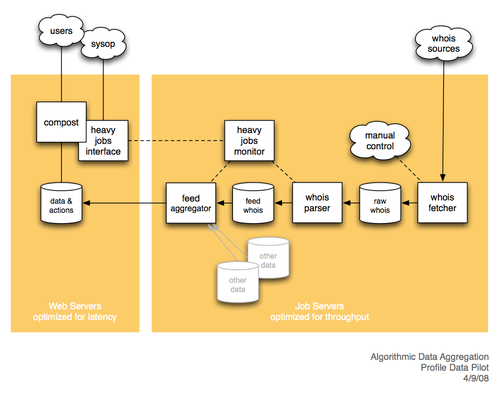HeavyJobs
Revision as of 14:22, 15 April 2008 by Ward Cunningham (talk | contribs) (→Bugs and Todos: worker marking)
What (summary)
Manage long-running jobs on available compute resources (servers) using db tables to keep track of work, and inter-process communication to keep track of workers.
Why this is important
We will use this infrastructure to manage our algorithmic data collection. This is a strategic direction for the company.
DoneDone
We will be satisfied with this infrastructure when:
- we can launch, balance, and diagnose all steps of our pilot whois refresh path.
- fetchers
- parsers
- aggregators
- we have startup scripts that will resume proper job processing after a machine reboot
- we can monitor overall health of all heavy job processing with zabbix, including system administrator alerts
Bugs and Todos
(prioritized high, medium and low for this week.)
- A worker should mark a chunk with its id (array of ids when restarted)
- this lets us draw a line per worker on throughput graph
- Workers should do partially completed chunks before starting new chunks.
- A worker should terminate when a manager has no more work to do
- unless there is a stream of new chunks from another job
- or do we want an autostart mechanism (getting too complex)
- unless there is a stream of new chunks from another job
- Integrate the two controllers (how to be determined)
- show chunk id in heavy_jobs/show
- show ps of workers in heavy_worker/status
- kill or restart hung workers
- move fetchers into framework, have it create parsing chunks
- Tally throughput, good records, etc
- keep a log of automatic actions
- Should HeavyJob be the source for actions?? Need better requirements here.
- Finer-grained progress
- Zabbix script to count busy and idle workers. (Or count something else interesting.)



